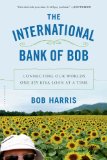Summary | Excerpt | Reviews | Beyond the Book | Readalikes | Genres & Themes | Author Bio

Connecting Our Worlds One $25 Kiva Loan at a Time
by Bob Harris
I'm nowhere near any of that, either.
Now all of the young men are making fists.
Mohammed has three children— two girls, fifteen and seven, plus a thirteen-year-old son— and he works these sixty-six-hour weeks to afford to send them to school, get them an education, and try to build a better life for them. That's why Mohammed stands in this small room, his hands, face, and blue overalls covered in oil and grease, for more than half of his waking hours on earth.
He has been guarded since my arrival, unsure what to make of this paunchy Midwesterner who speaks little Arabic and has no personal connection to Morocco, but has nonetheless stumbled into his tiny shop from halfway around the world, just to say hello.
Out of instinct, I start telling this total stranger about my dad.
James Robert Harris was a manual laborer for General Motors who often did overtime, second jobs, third jobs, whatever, just to put food on the table. I confess to Mohammed that I've never worked that hard in my life— but only thanks to my dad. I also tell Mohammed that I imagine he loves his kids much the same way that Dad loved my sister and me. I understand that this is why he works so hard.
And I am honored to meet a man capable of this kind of love.
This feels like a surprisingly naked thing to say to a stranger whom I've only just met, especially one from a different culture on the other side of the world from where I grew up. But it's the truth. I am honored. I do see this densely packed tiny garage as a work of love. It's obvious. So the words just kinda come out.
The credit or blame partly belongs to my translator, Bouchra, a young mother of two, bright, strong-willed, and compassionate.
I've only known her since this morning, but we've formed an instant friendship, and as I speak, my description of my dad brings a warm smile to Bouchra's face. I catch Mohammed reading her expression, which translates my feelings before we get around to specific words.
Encouraged, I go on.
I don't notice the small crowd forming in the street behind me.
Drawn by the curious sight of a Westerner, passers-by are starting to stop, ask each other who I am and what I am doing here, and discuss how they should all react.
As Bouchra translates, I start to feel nervous. I may have screwed up. It might be presumptuous of me— a relatively prosperous Westerner, privileged in gender and skin tone and even eye and hair color, a massive winner in the birth lottery despite my parents' poor Appalachian roots— to compare my dad's story to Mohammed's.
It might be more conventional— at least by my own culture's standards— to assume that Mohammed's life must be inconceivably different, to keep things objective and impersonal, ask business questions only, to sit quietly, take notes, and move on.
Mohammed has financed his tiny business with microloans, after all, and those loans are the ostensible subject here. His first loan five years ago, used to buy equipment and tools, was for the equivalent of less than $600, repayable at the rate of about $100 per month. As his business has grown, Mohammed now borrows and repays about $1,700 each year, using the credit to upgrade his equipment, hire help, smooth his cash flow, and more. Those numbers and plans were what I'd planned to ask about first. Then we could discuss what they meant: Without microcredit, would Mohammed's life be different? Would he have to work longer hours with poorer equipment, might he be unable to afford school for his kids? But here, with this Moroccan bike tinker on one of my first trips into the field, my intuition has been to tell him about my dad, see if that connects enough to open the conversation beyond numbers, and go from there. I'm flying on instinct, however. I'll just hope for the best.
Reprinted from The International Bank of Bob by Bob Harris. Copyright © 2013 by Bob Harris. Used by permission of Walker & Company, a division of Bloomsbury USA
Your guide toexceptional books
BookBrowse seeks out and recommends the best in contemporary fiction and nonfiction—books that not only engage and entertain but also deepen our understanding of ourselves and the world around us.